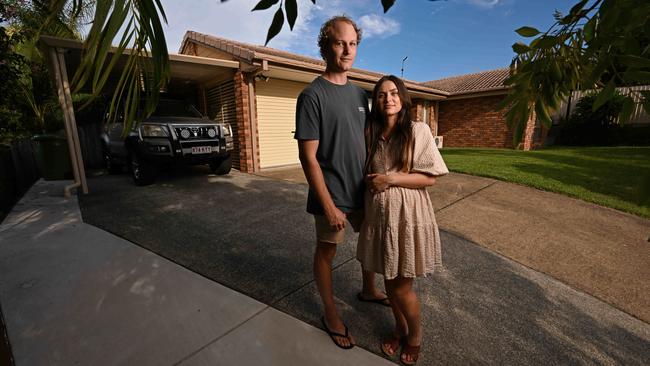It’s hello, baby girl, but goodbye loan safety buffer
The Sutherland family on the Gold Coast have had to change their plans ahead of the arrival of their baby girl as rising mortgage rates put a vice on household budgets.

Big changes are awaiting the Gold Coast’s Sutherland family this year. Not only are Elly and Ryan, aged 24 and 31, expecting a baby girl in 10 short weeks, but their mortgage repayments are also set to jump at the end of the year when their fixed home loan expires.
They bought their Nerang home back in November 2021 and were assessed for a buffer rate 3 per cent above their 2.2 per cent mortgage rate, which they fixed until the end of December.
While they knew rates wouldn’t stay low forever, the couple didn’t expect that loan buffer to be eroded within the first year and a half of their purchase.
It means Ms Sutherland’s hope of having an extended maternity leave has been dashed, with the primary school teacher now headed back to work after 30 weeks.
“We’ve been quite aware of reality slowly slipping away,” she said. “It’s not just high interest rates, it is high interest rates on big mortgages.”
Mr Sutherland added: “The dream of owning and raising kids means you have to have two full-time incomes, it’s not attainable otherwise.”
On Tuesday, the Reserve Bank lifted rates for a ninth consecutive month by 0.25 per cent. The cash rate now stands at 3.35 per cent, the highest it has been since 2012.
Mortgage holders with a $750,000 loan have had their repayments rise $1232 since April.
More increases have also been flagged after higher than expected inflation figures last year. Most economists are anticipating at least one more rise of 25 basis points to come.
There is already evidence that rate increases are impacting the housing industry. Chief economist at investment bank AMP Shane Oliver said housing-related indicators were all very weak, with the 9 per cent fall in home prices likely to depress consumer spending and confidence.
The Sutherlands have been proactive about rates going up and began to cut back on discretionary spending last May in the hopes of building up their savings. But Mr Sutherland is still frustrated that Reserve Bank governor Philip Lowe indicated rates would stay low until 2024, and is now saying the opposite.
“Banks say they’re trying to protect you and make sure that the loans are going to be solid and stable by adding that 3 per cent buffer on when they give you the loan,” he said.
“But if there’s no accountability in terms of how quickly rates can rise, then that is basically useless.”
Data firm SQM Research’s managing director Louis Christopher believes that if the Reserve Bank was walking a tightrope to deliver a soft landing for the economy, it is on a wire. He believes if the cash rate hits 4 per cent, the market risks entering a recession and causing the housing market to fall further than 10 per cent.
“If rates hit that level, home lenders took the view customers would experience serious problems to the point they would have to sell up,” Mr Christopher said.




To join the conversation, please log in. Don't have an account? Register
Join the conversation, you are commenting as Logout